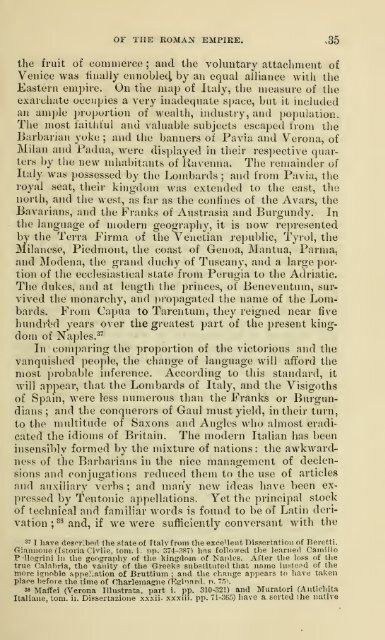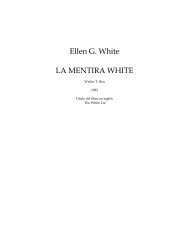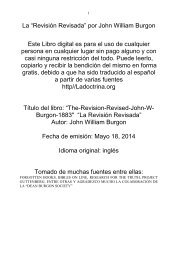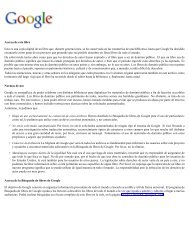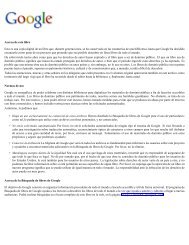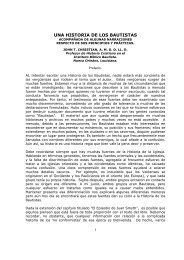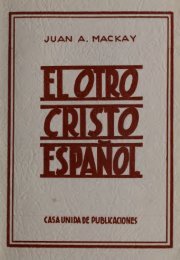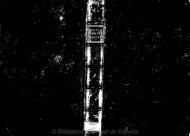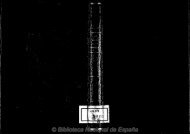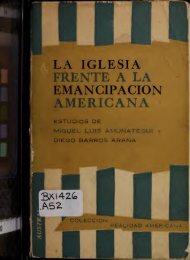- Page 2 and 3: Qavid ©. jUc^Kmj g£cbftaAij |0S .
- Page 7 and 8: THE HISTORY OP THE DECLINE AND FALL
- Page 9 and 10: « ^3^7 01 '4 CONTENTS OF THE FOURT
- Page 11 and 12: CONTENTS. 3 JL. D. PAGE. II. A pure
- Page 13 and 14: CONTENTS. O A. D. PAGE. Its Copies
- Page 15 and 16: CONTENTS. CHAPTER LI. THE CONQUEST
- Page 17 and 18: CONTEXTS. 9 CHAPTER LIII. STATE OF
- Page 19 and 20: CONTENTS. 11 A. r>. PACK. 1049—10
- Page 21 and 22: THE HISTORY OF THE DECLINE AND FALL
- Page 23 and 24: OF THE ROMAN EMPIRE. 15 three years
- Page 25 and 26: court of Turisund, king of OF THE R
- Page 27 and 28: OF THE ROMAN EMPIRE. 19 Gepicla3 co
- Page 29 and 30: OF THE ROMAN EMPIRE. 21 Barbarian c
- Page 31 and 32: OF THE ROMAN EMPIRE. 23 of relief,
- Page 33 and 34: OF THE ROMAN EMPIRE. 25 Rosamond, a
- Page 35 and 36: OP THE KOMAN EMPIRE. 27 infancy ; t
- Page 37 and 38: OF THE ROMAN EMPIRE. 29 attended an
- Page 39 and 40: OF THE ROMAN EMPIRE. 31 sus in Capp
- Page 41: OF THE ROMAN EMPIRE. 33 ris, the so
- Page 45 and 46: OF THE ROMAN EMPIRE. * 37 rapine. M
- Page 47 and 48: OF THE ROMAN EMPIRE. 3d isecl bride
- Page 49 and 50: OF THE ROMAN EMPIRE. 41 to the mali
- Page 51 and 52: OF THE ROMAN EMPIRE. 43 First attac
- Page 53 and 54: OF THE ROMAN EMPIRE. 45 six in Sici
- Page 55 and 56: OF THE ROMAN EMPIRE. 47 thousand of
- Page 57 and 58: OF THE ROMAN EMPIRE. 49 nate nation
- Page 59 and 60: OF THE EOMAK EMPIRE. 51 Barbarians,
- Page 61 and 62: OF THE ROMAN EMPIRE. 53 the voice o
- Page 63 and 64: OF THE ROMAN EMPIRE. 55 prudent cou
- Page 65 and 66: OF THE ROMAN EMPIRE. 57 guised his
- Page 67 and 68: OF THE ROMAN EMTIRE. 59 without a p
- Page 69 and 70: OF THE ROMAN EMPIRE. Gl Romans, and
- Page 71 and 72: OF THE T.OMAX EMPIRE. ()3 had not b
- Page 73 and 74: OF THE ROMAN EMPIRE. 65 The reign o
- Page 75 and 76: OF THE ROMAN EMPIRE. 67 waters!" Af
- Page 77 and 78: OF THE ROMAN EMPIRE. 69 seven miles
- Page 79 and 80: OF THE ROMAN EMPIRE. 71 could no lo
- Page 81 and 82: and flattered their pride OF THE RO
- Page 83 and 84: OF THE ROMAN EMPIRE. 75 •was reme
- Page 85 and 86: OF THE ROMAN EMPIRE. 77 punishment
- Page 87 and 88: OF THE ROMAN EMPIRE. 79 by the comm
- Page 89 and 90: OF THE ROMAN EMPIRE. 81 tropolis, s
- Page 91 and 92: OP THE ROMAN EMPIRE. 83 their true
- Page 93 and 94:
which OF THE ROMAN EMPIRE. 85 Place
- Page 95 and 96:
OF THE ROMAN EMPIRE. 87 u It was no
- Page 97 and 98:
OF THE ROMAN EMPIRE. 89 the signal
- Page 99 and 100:
des OF THE ROMAN EMPIRE. 91 victory
- Page 101 and 102:
OF THE ROMAN EMPIRE 93 himself, mad
- Page 103 and 104:
OF THE ROMAN EMPIRE. 95 trious by t
- Page 105 and 106:
OF THE EOMAN EMPIRE. 97 the plains
- Page 107 and 108:
OF THE ROMAN EMPIRE. 99 spair throu
- Page 109 and 110:
OF THE ROMAX EMPIRE. 1C1 he still d
- Page 111 and 112:
OF THE ROMAN EMPIRE. 103 the death
- Page 113 and 114:
OF THE ROMAN EMPIRE. 105 tion, in t
- Page 115 and 116:
OF THE ROMAN EMPIRE. 107 I. A lauda
- Page 117 and 118:
OF THE EOMAN EMPIRE. 109 suspicions
- Page 119 and 120:
OF THE ROMAN EMPIRE. Ill The rage o
- Page 121 and 122:
OF THE K0MAN EMPIRE 113 adopted wit
- Page 123 and 124:
OF THE EOMAiN" EMPIRE. 115 ligion.
- Page 125 and 126:
OF THE ROMAN EMPIRE. 117 Oriental s
- Page 127 and 128:
OF THE ROMAN EMPIRE. 119 co ony. Th
- Page 129 and 130:
OF THE ROMAN EMPIRE. 121 the merit
- Page 131 and 132:
OF THE ROMAN EMPIRE. 123 school of
- Page 133 and 134:
OF THE ROMAN EMPIRE. 125 twelve ana
- Page 135 and 136:
O^ THE ROMAN EMPIRE. 127 I am not t
- Page 137 and 138:
OF THE ROMAN EMPIRE. 129 The rash a
- Page 139 and 140:
OF THE ROMAN EMPIRE. 131 doctrine (
- Page 141 and 142:
OF THE EOJIAN EMPIRE. 133 insulted
- Page 143 and 144:
OF THE ROMAN EMPIRE. 135 For these
- Page 145 and 146:
OF THE ROMAN EMPIRE. 137 erful, and
- Page 147 and 148:
OF THE ROMAN EMPIRE. 139 language a
- Page 149 and 150:
OF THE ROMAN EMPIRE. 141 God, or in
- Page 151 and 152:
digni OF. THE KOMAN EMPIRE. 143 Hud
- Page 153 and 154:
OF THE ROMAN EMPIRE. 145 of Constan
- Page 155 and 156:
OF THE ROMAN EMPIRE. 147 ters of th
- Page 157 and 158:
OF THE ROMAN EMPIRE. 119 peace of t
- Page 159 and 160:
OF THE ROMAN EMPIRE. 151 Macarius o
- Page 161 and 162:
OF THE ROMAN EMPIRE. 153 ever, that
- Page 163 and 164:
OF THE ROMAN EMPIRE. 155 rising gen
- Page 165 and 166:
OF THE ROMAN EMPIRE. 157 ing to the
- Page 167 and 168:
OF THE ROMAN EMPIRE. 159 to the cat
- Page 169 and 170:
OP THE ROMAN EMPIRE. 161 dominion o
- Page 171 and 172:
OF THE ROMAN EMPIRE. 163 heads in t
- Page 173 and 174:
OF THE ROMAN EMPIRE. 165 of the pla
- Page 175 and 176:
OF THE ROMAN EMPIRE. 167 bites, who
- Page 177 and 178:
OY THE ROMAN EMPIKE. 169 at once of
- Page 179 and 180:
OF THE ROMAN EMPIRE. 171 kingdom, s
- Page 181 and 182:
OF THE ROMAN EMPIRE. 173 arch of Al
- Page 183 and 184:
OF THE ROMAN EMPIRE. 175 belief was
- Page 185 and 186:
OF THE ROMAN EMPIRE. 177 CHAPTER XL
- Page 187 and 188:
OF THE ROMAN EMPIRE. 179 or imperfe
- Page 189 and 190:
OF THE ROMAN EMPIRE. 181 nations of
- Page 191 and 192:
OF THE SOMAN EMPIRE. 183 you answer
- Page 193 and 194:
OF THE ROMAN EMPIRE. 185 embarked f
- Page 195 and 196:
OF THE EOMAX EMPIRE. 187 After the
- Page 197 and 198:
OF THE ROMAN EMPIRE. 189 the Danube
- Page 199 and 200:
9 OF THE ROMAN KMPIKE. 191 Between
- Page 201 and 202:
OF THE ROMAN EMPIKjU. 193 religious
- Page 203 and 204:
OF THE ROMAN EMPIRE. 195 the settle
- Page 205 and 206:
OF THE ROMAX EMPIRE. 197 tude and r
- Page 207 and 208:
OF THE ROMAtf EMPIRE. 199 ficient t
- Page 209 and 210:
" OF THE ROMAN EMPIRE. 201 feast, h
- Page 211 and 212:
OF THE EOMAN EMPIKE. 203 excluded f
- Page 213 and 214:
influence; OF THE ROMAN EMPIRE. 205
- Page 215 and 216:
OF THE ROMAN EMPIRE. 207 and sleep,
- Page 217 and 218:
OF THE ROMAN EMPIRE. 209 cated to t
- Page 219 and 220:
OF THE ROMAN EMPIRE. 211 silics, wh
- Page 221 and 222:
OF THE EOMAN EMPIRE. 213 were of eq
- Page 223 and 224:
OF THE ROMAN EMPIRE. 215 tunes of C
- Page 225 and 226:
OF THE ROMAN EMPIRE. 217 hatred of
- Page 227 and 228:
OF THE ROMAN EMPIRE. 219 death of Z
- Page 229 and 230:
OF THE ROMAN EMPIRE. 221 band, and,
- Page 231 and 232:
OF THE ROMAN EMPIRE. 223 session of
- Page 233 and 234:
OF THE ROMAN EMPIRE. 225 was adorne
- Page 235 and 236:
OF THE ROMAN EMPIRE. 227 dom and co
- Page 237 and 238:
The life OP THE ROMAN EMPIRE. 229 o
- Page 239 and 240:
OP THE ROMAN EMPIRE. 231 signet fro
- Page 241 and 242:
OF THE KOMAN EMPIRE. 238 filled by
- Page 243 and 244:
OF THE ROMAN EMPIRE. 235 ished, and
- Page 245 and 246:
OF THE ROMAN EMPIRE. 237 self, and
- Page 247 and 248:
OF THE ROMAN EMPIRE. 239 champion o
- Page 249 and 250:
OF THE ROMAN EMPIRE. 241 which show
- Page 251 and 252:
OP THE ROMAN EMPIRE. 243 able to fo
- Page 253 and 254:
OF THE ROMAN EMPIRE. 4245 Heraclius
- Page 255 and 256:
OF THE ROMAN EMPIRE. 247 of the pro
- Page 257 and 258:
OF THE ROMAN EMPIRE. 249 apologists
- Page 259 and 260:
OF THE EOMAN EMPIRE. 251 The merit
- Page 261 and 262:
OF THE ROMAN EMPIRE. 2f3 transcript
- Page 263 and 264:
OF THE ROMAN EMPIRE. 255 not reconc
- Page 265 and 266:
OF THE ROMAN EMPIRE. 257 prince was
- Page 267 and 268:
OF THE ROMAN EMPIRE. 259 lire to ex
- Page 269 and 270:
OF THE ROMAN EMPIRE. 261 moderate C
- Page 271 and 272:
OF THE ROMAN EMPIEE. 263 can remove
- Page 273 and 274:
OF THE EOMAN EMPIRE. 265 eral quart
- Page 275 and 276:
terror. OF THE ROMAN EMPIRE. 267 Th
- Page 277 and 278:
OF THE ROMAN EMPIRE. 269 gence and
- Page 279 and 280:
OF THE EOMAN EMPIRE. 271 that etern
- Page 281 and 282:
OF THE ROMAN EMPIRE. 2j 3 Denys, pl
- Page 283 and 284:
OF THE ROMAN EMPIRE. 275 bardy and
- Page 285 and 286:
OF THE ROMAN EMPIRE. 277 empire ; a
- Page 287 and 288:
OP THE ROMAN EMPIRE 279 the Roman c
- Page 289 and 290:
OF THE ROMAN EMPIRE. 281 orthodoxy
- Page 291 and 292:
OF THE ROMAN EMPIRE. 283 tncir frie
- Page 293 and 294:
OF THE ROMAN EMPIRE. 285 prise on b
- Page 295 and 296:
OF THE ROMAN EMPIRE. '287 whom the
- Page 297 and 298:
OF THE liOMAN EMPIRE. 289 by the oi
- Page 299 and 300:
OF THE ROMAN EMPIRE. 291 of the Chr
- Page 301 and 302:
OF THE ROMAN EMPIRE. 293 faintly at
- Page 303 and 304:
OF THE ROMAN EMPIRE. 295 father, an
- Page 305 and 306:
OF THE ROMAN EMPIRE. 297 ratified b
- Page 307 and 308:
." , OF THE ROMAN EMPIRE. 299 and i
- Page 309 and 310:
OF THE ROMAN EMPIRE. 301 The bastar
- Page 311 and 312:
OF THE ROMAN EMPIRE. 303 "Romans,"
- Page 313 and 314:
OF THE ROMAN EMPIRE. 305 to protect
- Page 315 and 316:
OF THE ItOMAN EMPJEJJ. 307 Milan so
- Page 317 and 318:
OF THE ROMAN EMPIRE. 309 could be d
- Page 319 and 320:
OP THE HUMAN EMP1EE. 311 than the e
- Page 321 and 322:
OF THE ROMAN EMPIRE. 313 temporary
- Page 323 and 324:
OF THE SOMAN EMPIRE. 315 triangle o
- Page 325 and 326:
OF THE ROMAN EMPIRE. 317 the same,
- Page 327 and 328:
OF THE ROMAN EMPIRE. 319 furniture,
- Page 329 and 330:
OF THE ROMAN EMPIRE. 321 of the Kor
- Page 331 and 332:
OF THE ROMAN EMPIRE. 323 attempted.
- Page 333 and 334:
OF THE ROMAN EMPIRE. 325 and Roman
- Page 335 and 336:
OF THE ROMAN EMPIRE. 327 but in Ara
- Page 337 and 338:
OF THE ROMAN EMPIRE. 329 moralists
- Page 339 and 340:
OF THE ROMAN EMPIRE. 331 blind myth
- Page 341 and 342:
OF THE ROMAN EMPIRE. 333 have been
- Page 343 and 344:
OF THE ROMAN EMPIRE. 335 and a far
- Page 345 and 346:
OF THE F.OMAN EMPIEE. 337 sera of t
- Page 347 and 348:
OF THE ROMAN empire. 339 agination
- Page 349 and 350:
OF THE ROMAN EMPIRE. 341 the knowle
- Page 351 and 352:
OF THE ROMAN EMPIRE. 343 been the r
- Page 353 and 354:
OF THE ROMAN EMPIRE. 345 The commun
- Page 355 and 356:
OF THE ROMAN EMPIRE. 347 water of Z
- Page 357 and 358:
OF THE ROMAN EMPIRE. 349 church. Th
- Page 359 and 360:
OP THE ROMAN EMPIRE. 351 104 hornet
- Page 361 and 362:
OF THE KOMAX EMPIRE. 353 jected, by
- Page 363 and 364:
OF THE KOMAN EMPIRE. 355 those of h
- Page 365 and 366:
OF THE ROMAX EMPIRE. 357 The people
- Page 367 and 368:
OF THE ROMAN EMPIRE. 359 ries, stil
- Page 369 and 370:
OF THE ROMAN EMPIRE. 361 on that ch
- Page 371 and 372:
OF THE ROMAN EMPIRE. 3G3 profession
- Page 373 and 374:
OF THE EOMAN EMPIRE. 8G5 instantly
- Page 375 and 376:
OF THE ROMAN EMPIRE. 367 had they r
- Page 377 and 378:
OF THE ROMAN EMPIRE. 3G9 hastily dr
- Page 379 and 380:
OF THE ROMAN EMPIRE. 371 opinions s
- Page 381 and 382:
OF THE ROMAN EMPIRE. 373 maturity o
- Page 383 and 384:
01? THE ROMAN EMPIRE. 375 Tabuc. Be
- Page 385 and 386:
OF THE ROMAN EMPIKE. 377 Supreme Be
- Page 387 and 388:
OF THE ROMAN EMPIRE* 379 enthusiasm
- Page 389 and 390:
OP THE ROMAN EMPIRE. 381 and his re
- Page 391 and 392:
OF THE ROMAN EMPIRE. 383 serious an
- Page 393 and 394:
OF THE ROMAN EMPIRE. 385 The silenc
- Page 395 and 396:
OF THE KOMAN EMPIRE. 387 of the Per
- Page 397 and 398:
OF THE ROHAN EMPIRE. 3g9 martial ac
- Page 399 and 400:
OF THE ROMAN EMPIRE. 391 the solemn
- Page 401 and 402:
OF THE ROMAN EMPIRE. 393 and repeat
- Page 403 and 404:
OF THE ROMAN EMPIRE. 395 Hosein wil
- Page 405 and 406:
OF THE ROMAN EMPIRE. 397 Hassan, is
- Page 407 and 408:
OF THE ROMAN EMPIRE. 399 casions th
- Page 409 and 410:
OF THE ROMAN EMPIRE. 401 first cali
- Page 411 and 412:
OF THE ROMAN EMPIRE. 403 they calml
- Page 413 and 414:
OF THE ROMAN EMPIRE. 405 to unfold
- Page 415 and 416:
OF THE ROMAN EMPIRE. 407 • active
- Page 417 and 418:
OF THE ROMAN .UMPIRE. 409 navigatio
- Page 419 and 420:
OP THE ROMAN EMPIRE. 411 invested w
- Page 421 and 422:
OF THE ROMAN EMPIRE. 413 slave. Aft
- Page 423 and 424:
OF THE ROMAN EMPIRE. 415 and the Ma
- Page 425 and 426:
Destroy OF THE ROMAN EMPIRE. 417 ce
- Page 427 and 428:
OF THE ROMAN EMPIRE. 419 these citi
- Page 429 and 430:
OF THE ROMAN EMPIRE. 421 Palmyra, a
- Page 431 and 432:
OF THE ROMAN EMPIRE. 423 of a soldi
- Page 433 and 434:
OF THE ROMAN EMPIRE. 425 Aban, who
- Page 435 and 436:
OP THE ROMAN EMPIRE. 427 and to wai
- Page 437 and 438:
OF THE ROMAN EMPIRE. 429 odicea, at
- Page 439 and 440:
1 OF THE ROMAN EMPIRE. 431 Syria, 0
- Page 441 and 442:
OF THE ROMAN EMPIRE. 433 not to ent
- Page 443 and 444:
OF THE ROMAN EMPIRE. 435 separated
- Page 445 and 446:
OF THE ROMAN EMPIRE. 437 to dissuad
- Page 447 and 448:
OP THE ROMAN EMPIRE. 439 plaints, o
- Page 449 and 450:
OF THE ROMAN EMPIRE. 441 his confes
- Page 451 and 452:
OF THE ROMAN EMPIRE. 443 Therefore
- Page 453 and 454:
OF THE IiOMAX EMPIRE. 445 who is sa
- Page 455 and 456:
OF THE ROMAN EM TIKE. 447 you have
- Page 457 and 458:
OF THE ROMAN EMPIRE. 449 of Egypt,
- Page 459 and 460:
OF THE ROMAN EMPIRE. 451 prise. The
- Page 461 and 462:
OF THE ROMAN EMPIRE 453 fortificati
- Page 463 and 464:
OF THE ROMAN EMPIRE. 455 wno studie
- Page 465 and 466:
OF THE ROMAN EMPIRE. 457 fleets mig
- Page 467 and 468:
OF THE ROMAN EMPIRE. 459 thousand p
- Page 469 and 470:
OF THE ROMAN EMPIRE. 461 The daught
- Page 471 and 472:
OF THE ROMAN EMPIRE. 463 the orator
- Page 473 and 474:
OF THE ROMAN EMPIRE. 465 Fortunate,
- Page 475 and 476:
OF THE ROMAN EMPIRE. 407 that kingd
- Page 477 and 478:
OF THE ROMAN EMPIRE. 469 overwhelme
- Page 479 and 480:
OF THE ROMAN EMPIRE. 471 who offere
- Page 481 and 482:
OF THE ROMAN EMPIRE. 473 traitors a
- Page 483 and 484:
OF THE ROMAN EMPIRE. 475 started fr
- Page 485 and 486:
OF THE ROMAN EMPIRE. 4*4 hands. The
- Page 487 and 488:
OF THE ROMAN EMPIRE. 479 Carcassone
- Page 489 and 490:
OF THE ROMAN EMPIRE. 481 that of hi
- Page 491 and 492:
OF THE ROMAN EMPIRE. 483 "beneficia
- Page 493 and 494:
OF THE ROMAN EMPIRE. 485 awakened b
- Page 495 and 496:
OF THE ROMAN EMPIRE. 487 tains and
- Page 497 and 498:
OF THE ROMAN EMPIRE. 489 Almohades,
- Page 499 and 500:
OF THE ROMAN EMPIRE. 491 senate, or
- Page 501 and 502:
OF THE ROMAN EMPIRE. 493 his discip
- Page 503 and 504:
OF THE ROMAN EMPIRE. 405 tary shade
- Page 505 and 506:
OF THE ROMAN EMPIRE. 497 was alarme
- Page 507 and 508:
OF THE ROMAN EMFIRE. 499 maininsr f
- Page 509 and 510:
OF THE ROMAN EMPIRE. 501 prone to t
- Page 511 and 512:
OF THE ROMAN EMPIRE. 503 tinned to
- Page 513 and 514:
OF THE ROMAN EMPIRE. 505 Cerdagne w
- Page 515 and 516:
OF THE ROMAN EMPIRE. 507 were inevi
- Page 517 and 518:
OF THE ROMAN EMPIRE. 509 sion had b
- Page 519 and 520:
OF THE KOMAN EMPIRE. 511 were mista
- Page 521 and 522:
OF THE ROMAN EMPIRE. 513 men and si
- Page 523 and 524:
OP THE ROMAN EMPIRE. 515 supported,
- Page 525 and 526:
OF THE ROMAN" EMPIRE. 517 the Mahom
- Page 527 and 528:
OF THE ROMAN EMPIRE. 519 the whole
- Page 529 and 530:
OF THE ROMAN EMPIRE, 521 the Grecia
- Page 531 and 532:
OF THE ROMAN EMPIRE. 523 moral and
- Page 533 and 534:
OF THE ROMAN EMPIRE 525 of blood an
- Page 535 and 536:
OF THE EOMAN EMPIRE. 527 clamors ac
- Page 537 and 538:
OF THE ROMAN EMPIRE. 529 In the suf
- Page 539 and 540:
OF THE ROMAN EMPIRE. 531 equal reso
- Page 541 and 542:
OP THE ROMAN EMPIRE. 533 the Greeks
- Page 543 and 544:
OF THE ROMAN EMPIRE. 535 servitude,
- Page 545 and 546:
OF THE ROMAN EMPIRE. 537 • few, t
- Page 547 and 548:
OF THE ROMAN EMPIRE. 539 restored t
- Page 549 and 550:
OF THE ROMAN EMPIRE. 541 at first f
- Page 551 and 552:
OF THE ROMAN EMPIRE. 543 one was a
- Page 553 and 554:
OF THE ROMAN EMPIRE. 545 was the so
- Page 555 and 556:
OF THE ROMAN EMPIRE. 547 from the n
- Page 557 and 558:
OF THE ROMAN EMPIRE. 549 CHAPTER LI
- Page 559 and 560:
OF THE ROMAN EMPIRE. 551 and the ha
- Page 561 and 562:
OF THE ROMAN EMPIRE, 553 overspread
- Page 563 and 564:
OF THE ROMAN EMPIRE. 555 empire was
- Page 565 and 566:
OF THE ROMAN EMPIRE. 557 or Free-La
- Page 567 and 568:
OF THE ROMAN EMPIRE. 559 of all the
- Page 569 and 570:
OF THE ROMAX EMPIRE. 5G1 pose the p
- Page 571 and 572:
OF THE ROMAN EMPIRE. 563 most exqui
- Page 573 and 574:
see OF THE SOMAN EMPIRE. 565 Alexiu
- Page 575 and 576:
OF THE ROMAN EMPIRE. 567 generals ;
- Page 577 and 578:
missed with a robe of honor. 52 OF
- Page 579 and 580:
OF THE ROMAN EMPIRE. 571 reluctant
- Page 581 and 582:
OF THE ROMAN EMPIRE. 573 and Anno,
- Page 583 and 584:
OF THE ROMAN EMPIRE. 575 monarch ma
- Page 585 and 586:
OF THE ROMAN EMPIRE. 577 clear and
- Page 587 and 588:
OF THE EOMAN EMPIRE. 579 line fell
- Page 589 and 590:
OF THE ROMAN EMPIRE. 581 L lines ;
- Page 591 and 592:
OF THE ROMAX EMPIRE. 583 bishop who
- Page 593 and 594:
OP THE ROMAN EMPIRE. 585 city, whic
- Page 595 and 596:
OF THE ROMAX EMPIRE. 587 While the
- Page 597 and 598:
- OF THE ROMAN EMPIRE. 589 or those
- Page 599 and 600:
OF THE ROMAN EMIGRE. 591 la e. In e
- Page 601 and 602:
OF THE ROMAN EMPIRE. 593 CHAPTER LI
- Page 603 and 604:
OF THE ROMAN EMPIRE. 595 hood of Sa
- Page 605 and 606:
OF THE ROMAN EMPIRE. 597 escape to
- Page 607 and 608:
OF THE ROMAS EMPIRE. 599 and milita
- Page 609 and 610:
OF THE ROMAN EMPIRE G01 boring lull
- Page 611 and 612:
OF THE ROMAN EMPIRE. C03 restored a
- Page 613 and 614:
OF THE ROMAN EMPIRE. 605 Three diff
- Page 615 and 616:
OF THE ROMAN EMPIRE. G07 have enfra
- Page 617 and 618:
OF THE ROMAN EMPIRE. 609 which he w
- Page 619 and 620:
OF THE ROMAN EMPIRE. 611 CHAPTER LV
- Page 621 and 622:
OF THE ROMAN EMPIRE. 613 able evide
- Page 623 and 624:
OP THE ROMAN EMPIRE. 615 tivity of
- Page 625 and 626:
OP THE ROMAN EMPIRE. 61 criticism c
- Page 627 and 628:
OF THE ROMAN EMPIRE. 619 lete and s
- Page 629 and 630:
OF THE ROMAN EMPIRE. 621 pied by th
- Page 631 and 632:
OF THE ROMAN EMPIRE. 623 their requ
- Page 633 and 634:
OP THE ROMAN EMPIRE. * 625 princes
- Page 635 and 636:
OP THE ROMAN EMPIRE. 627 East, to t
- Page 637 and 638:
OF THE ROMAN EMPIRE. 629 England ;
- Page 639 and 640:
OF THE ROMAN EMPIRE. 631 Between th
- Page 641 and 642:
OF THE ROMAN EMPIRE. 633 force the
- Page 643 and 644:
OF THE ROMAN EMPIRE. 635 statue in
- Page 645 and 646:
OF THE ROMAN EMPIRE. 037 provoked t
- Page 647 and 648:
Ap^-no-cra OF THE ROMAN EMPIRE. 639
- Page 649 and 650:
Listen OF THE ROMAN EMPIRE. 641 pre
- Page 651 and 652:
OF THE ROMAN EMPIRE. 643 CHAPTER LV
- Page 653 and 654:
OF THE ROMAN EMPIRE. 645 were few i
- Page 655 and 656:
OF THE ROMAN EMPIRE. 647 ignorance,
- Page 657 and 658:
M OF THE ROMAN EMPIRE. 649 "Should
- Page 659 and 660:
— — : OF THE ROMAN EMPIRE. 651
- Page 661 and 662:
consult m y OF THE ROMAN EMPIRE. 65
- Page 663 and 664:
; OF THE ROMAN EMPIRE. 655 avarice
- Page 665 and 666:
OF THE ROMAN EMPIRE. 657 been three
- Page 667 and 668:
OF THE SOMAN EMPIRE. 059 sively att
- Page 669 and 670:
OF THE ROMAN EMPIRE. 661 hundred bi
- Page 671 and 672:
; OF THE ROMAN EMPIRE. 663 moment t
- Page 673 and 674:
OF THE ROM AX EM TIKE. 665 disgrace
- Page 675 and 676:
OF THE ROMAN EMPIRE. 667 to embrace
- Page 677 and 678:
OF THE 110MAN EMPIRE. GG9 gested to
- Page 679 and 680:
; OF THE ROMAN EMPIRE. 671 five hun
- Page 681 and 682:
OF THE ROMAN EMPIRE. 673 disorderly
- Page 683 and 684:
OF THE ROMAN EMPIRE. 675 of the mis
- Page 685 and 686:
O? THE ROMAN EMPIRE. 677 had degrad
- Page 687 and 688:
; OF THE ROMAN EMPIRE. 679 dcms of
- Page 689 and 690:
OF THE ROMAN EMPIRE. 681 burial of
- Page 691 and 692:
OF THE ROMAN ENTIRE. 683 carious du
- Page 693 and 694:
OF THE ROMAN EMPIRE. 685 zantine co
- Page 695 and 696:
; OF THE ROMAN EMPIRE. 687 tended k
- Page 697 and 698:
OF THE ROMAN EMPIRE. G89 nicated th
- Page 699 and 700:
OP THE ROMAN EMPIRE. 691 arms by da
- Page 701 and 702:
OF THE ROMAN EM PIKE. 693 Catana ha
- Page 703 and 704:
OF THE ROMAN EMPIRE. 695 and the no
- Page 705 and 706:
OF THE EOMAK" EMPIRE. 697 provinces
- Page 707 and 708:
OF THE ROMAN EMPIRE. 699 were peopl
- Page 709 and 710:
OF THE ROMAN EMPIRE. 701 rifled by
- Page 711 and 712:
; OF THE ROMAN EMPIRE. 703 enemies,
- Page 713 and 714:
OF THE ROMAN EMPIRE. 705 continued
- Page 715 and 716:
OF THE ROMAN EMPIRE. 707 liis title
- Page 717 and 718:
OF THE ROMAN EMPIRE. 709 son Malek
- Page 719 and 720:
OF THE ROMAN EMPIRE. 711 sultan, Ro
- Page 721 and 722:
OF THE ROMAN EMPIRE. 713 gently adm
- Page 723 and 724:
fall by the hand of an assassin." 3
- Page 725 and 726:
OF THE ROMAN EMPIRE. 717 with moscb
- Page 727 and 728:
OF THE ROMAN EMPIRE. 719 liar care,
- Page 729 and 730:
OF THE ROMAN EMPIRE. 721 Euxine the
- Page 731 and 732:
OF THE ROMAN EMPIRE. 723 but the ar
- Page 733 and 734:
; OF THE ROMAN EMPIRE. 725 The revo
- Page 735 and 736:
OF THE ROMAN EMPIRE. 727 restitutio
- Page 737:
OF THE ROMAN EMPIRE. 729, V and mor


